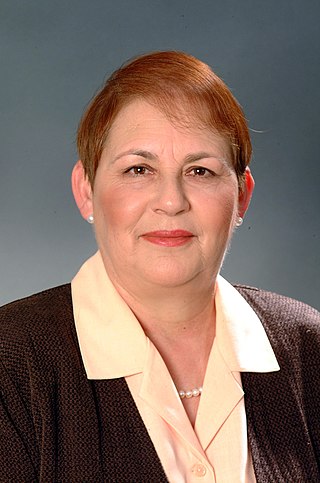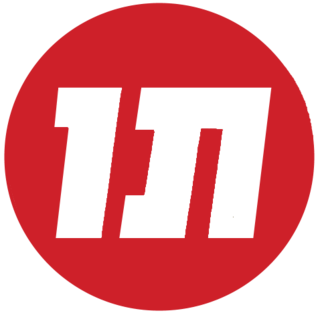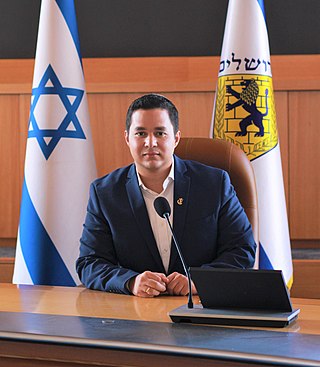Related Research Articles

Levi Eshkol, born Levi Yitzhak Shkolnik, was an Israeli statesman who served as the third Prime Minister of Israel from 1963 until his death from a heart attack in 1969. A founder of the Israeli Labor Party, he served in numerous senior roles, including Minister of Defense (1963–1967) and Minister of Finance (1952–1963).

Mapai was a democratic socialist political party in Israel, and was the dominant force in Israeli politics until its merger into the modern-day Israeli Labor Party in 1968. During Mapai's time in office, a wide range of progressive reforms were carried out, as characterised by the establishment of a welfare state, providing minimum income, security, and free access to housing subsidies and health and social services.

Herut was the major conservative nationalist political party in Israel from 1948 until its formal merger into Likud in 1988. It was an adherent of Revisionist Zionism.

Amnon Linn was an Israeli politician, jurist and member of Knesset.
The General Zionists were a centrist Zionist movement and a political party in Israel. The General Zionists supported the leadership of Chaim Weizmann and their views were largely colored by central European culture. Their political arm is one of the ancestors of the modern-day Likud.

Gahal was the main right-leaning political alliance in Israel, ranging from the centre-right to right-wing, from its founding in 1965 until the establishment of Likud in 1973. It was led by Menachem Begin.
Hatzohar, full name Brit HaTzionim HaRevizionistim, was a Revisionist Zionist organization and political party in Mandatory Palestine and newly independent Israel.

Meir Porush is an Israeli politician who has served as a member of the Knesset for the Haredi Agudat Yisrael faction of United Torah Judaism in several spells since 1996. He served as the Deputy Minister of Education.
The Progressive Party was a liberal political party in Israel.
The United Religious Front was a political alliance of the four major religious parties in Israel, as well as the Union of Religious Independents, formed to fight in the 1949 elections.

The Israeli Liberal Party, also known as the Liberal Party in Israel was a political party in Israel and one of the forerunners of the modern-day Likud. The party was created by a 1961 merger between the centrist Progressive Party and the General Zionists, forming a right-leaning, middle class-based party. The Progressives soon seceded to form the Independent Liberals in 1964.

Professor Yehudit Naot was an Israeli scientist and politician. She served as Minister of the Environment between February 2003 and October 2004.

Ahdut HaAvoda was the name used by a series of political parties. Ahdut HaAvoda in its first incarnation was led by David Ben-Gurion. It was first established during the period of British Mandate and later became part of the Israeli political establishment. It was one of the forerunners of the modern-day Israeli Labor Party.
Elections are held in Jerusalem to elect the city's mayor. Currently, such elections are regularly scheduled to elect mayors to five-year terms.
Elections are held in Tel Aviv to elect the city's mayor. Currently, such elections are regularly scheduled to elect mayors to five-year terms.
Elections are held in Haifa to elect the city's mayor. Currently, such elections are regularly scheduled to elect mayors to five-year terms.
Municipal elections took place in Israel on 2 November 1965, alongside elections to the sixth Knesset.
Municipal elections took place in Israel on 3 November 1959, alongside elections to the fourth Knesset.

Municipal elections took place in Israel for the first time on 14 November 1950. These elections were conducted in a matter similar to legislative elections, and turnout stood at approximately 80%. Due to pressure from the ruling party, Mapai, the voting age was lowered from 21 to 18. Mapai ran under the name 'the Histadrut list', which received criticism from Mapam. All religious parties ran as part of the United Religious Front. The General Zionists made significant gains when compared to their legislative power.

Dan Eliyahu Ya'akov Illouz is a Canadian-born Israeli politician currently serving as a member of the Knesset for the Likud party since January 2023. He was previously a city councillor in Jerusalem.
References
- ↑ "ההשתתפות הגיעה ל80%". Haaretz . National Library of Israel. p. 1. Archived from the original on 2022-09-24. Retrieved 2022-04-09.
- ↑ Golan, Arnon (2010). "בחירות עירוניות בתל–אביב בשנות החמישים. תהליכים, תוצאות והשלכות" (PDF). עיונים בתקומת ישראל (in Hebrew). pp. 80–100. Archived (PDF) from the original on 2022-09-02. Retrieved 2022-09-02.
- ↑ "הפיצול בעיריית ירושלים בעינו". Haaretz (in Hebrew). National Library of Israel. 1955-07-28. pp. 1–2. Archived from the original on 2022-09-24. Retrieved 2022-09-18.
- ↑ "עוד לא הוכרע גורל ראשות העיר תל אביב". Haaretz (in Hebrew). National Library of Israel. 1955-07-28. p. 1. Archived from the original on 2022-09-24. Retrieved 2022-09-18.
- ↑ "נצחון למפא"י בחיפה - מפלה למשמיציה". Davar (in Hebrew). National Library of Israel. 1955-07-28. p. 1. Archived from the original on 2022-09-24. Retrieved 2022-09-22.
- ↑ "תוצאות הבחירות לעיריית באר שבע". HaBoker . National Library of Israel. 1955-07-29. p. 10. Archived from the original on 2022-09-24. Retrieved 2022-09-23.
- 1 2 "ילקוט הפרסומים - הודעה בדבר הבחירות למועצות העיריות" (PDF). Nevo. Archived (PDF) from the original on 2022-09-02. Retrieved 2022-09-24.
- 1 2 "חלוקת המנדטים ברשויות מקומיות". Davar (in Hebrew). National Library of Israel. 1955-07-31. p. 2. Archived from the original on 2022-09-24. Retrieved 2022-09-22.
- ↑ "חנה לוין נבחרה ראש עיריית רשל"צ". Davar . National Library of Israel. 1956-10-23. p. 4. Archived from the original on 2022-09-24. Retrieved 2022-09-22.
- ↑ "המועצה המקומית". rishonim-e-y.org.il. Archived from the original on 2022-04-30. Retrieved 2022-09-24.
- 1 2 3 4 "ילקוט הפרסומים - הודעה בדבר בחירות למועצות המקומיות" (PDF). Nevo. Archived (PDF) from the original on 2022-09-02. Retrieved 2022-09-24.